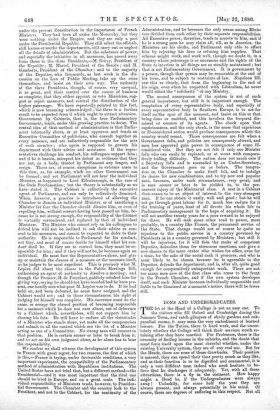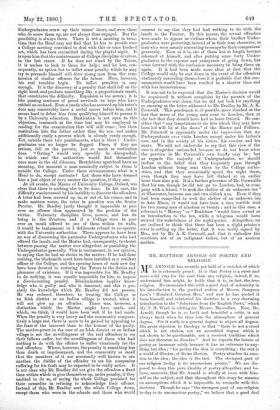DONS . AND UNDERGRADUATES.
THE lot of the Head of a College is not an easy one. To the visitors who fill Oxford and Cambridge during the Summer Term, and catch glimpses of shady gardens and oak- panelled rooms, it may seem the very embodiment of learned leisure. For the Tutors, there is hard work, and the uncer- tainty whether the College will think their services worth re- taining after they have married. For Professors, there is the necessity of finding houses in the suburbs, and the doubt that must force itself upon the most cheerful whether, under the existing University system, they are of any real use. But for the Heads, there are none of these drawbacks. Their position is assured, they can spend their time pretty much as they like, and as their function is to be dignified and ornamental, it is only a very diffident man indeed who need hesitate to be- lieve that he discharges it adequately. Yet, with all these attractions, there is a fly in the ointment. How happy might a Head be, if the Undergraduates were always away 1 Unluckily, for some half the year they are always present, and always potentially in his mind. Of course, there are degrees of suffering in this respect. Not all Undergraduates screw up their tutors' doors, and even those who do screw them up, are not always thus engaged. But the possibility is always there. There is not a morning in term- time that the Head may not find that he has to preside over a College meeting convoked to deal with this or some kindred act, which has been committed during the playful night. It is upon him that the maintenance of College discipline devolves, in the last resort. if he does not stand by the Tutors, it is useless to look to them for help ; and he has, con- sequently, no option but to inflict some penalty which he may try to persuade himself will deter young men from the com- mission of similar offences for the fixture. Here, however, his real troubles begin. To inflict penalties is easy enough. It is the discovery of a penalty that shall fall on the right head, and produce something like a proportionate result, that constitutes the difficulty. Expulsion is too severe ; it is like passing sentence of penal servitude on boys who have robbed an orchard. Even a youth who has screwed .up his tutor's door may conceivably have a useful career before him, and it seems hard to debar him from qualifying himself to pursue it by a University education. Rustication is not open to this objection, inasmuch as the time lost may be employed in reading for the examination that will still come ; but then rustication hits the father rather than the son, and makes additionally costly a process which is already costly enough. Yet, outside these two punishments, what is there ? Under- graduates can no longer be flogged. Fines, if they are serious, fall on the parents, just as much as rustication does. " Gating " would very speedily be disregarded, in which case the authorities would find themselves once more in-the old dilemma. Restrictions upon food have no meaning, the moment a man nominally subject to them is outside the College. Under these circumstances, what is a Head to do, except rusticate ? Let those who have deemed him a just object of envy answer the question, if they can.
At all events, the Master of University College, Oxford, was clear that there is nothing else to be done. In his case, the difficulty was increased by his inability to discover the offenders. A tutor had been screwed up in, or out of, his rooms, and to make matters worse, the tutor in question was the Senior Proctor. Mr. Bradley justly thought it impossible to pass over an offence thus aggravated by the position of the victim. University discipline lives, moves, and has its being in the Proctors, and if a College were to pass over an insult offered to one of them within its walls, it would be tantamount to k deliberate refusal to co-operate with the University authorities. There appears to have been no way of discovering the particular Undergraduates who had offered the insult, and the Master had, consequently, to choose between passing the matter over altogether, or punishing the Undergraduates generally. This is tantamount, in our opinion, to saying that he had no choice in the matter. If he had done nothing, the blacksmith must have been installed as a resident officer of the College, and the opening hours of each new day. have been devoted to restoring the Tutors to the duties and pleasures of existence. If it was impossible for Mr. Bradley to do nothing, it was equally impossible for him to impose a discriminating penalty. Discrimination implies know- ledge who is guilty and who is innocent, and this is pre- cisely the knowledge which Mr. Bradley did not possess. He was reduced, therefore, to treating the College as an Irish district or an Indian village is treated, when it will not give up an offender. There was, however, a distinction which the Master might have made, and which, we think, it would have been well if be had made. When the penalty is very heavy and the community compara- tively a large one, there is more to be gained by appealing to the fears of the innocent than to the honour of the guilty. The motive-power in the case of an Irish district or an Indian village is not the unwillingness of the real offenders to see their fellows suffer, but the unwillingness of those who had nothing to do with the offence to suffer vicariously for the real offenders. Where, however, the penalty is something less than death or imprisonment, and the community so small that the members of it are necessarily well known to one another, the dislike of the offender to see his companion suffering for his fault may be expected to be really active. It is not clear why Mr. Bradley did not give the offenders a fixed time within which to give themselves up, under penalty, if they omitted to do so, of seeing the whole College punished for their cowardice in refusing to acknowledge their offence. Instead of this, Mr. Bradley sent. the whole College down, except those who were in the schools and those who would consent to say that they had had nothing to do with the insult to the Proctor. By this means, the actual offenders were made to appear as victims whom their brother Under- graduates were protecting, instead of in their true character, as men who were meanly consenting to escape by their companions' generosity. Even as it is, one of them has at length become ashamed of .himself, and after putting some forty Under- graduates to the expense and annoyance of going down, has come forward with the confession necessary to bring them up again. If it had been made more clear at first that the Colfege would only be sent down in the event of the offenders obstinately concealing themselves, it is probable that this con- summation would have been reached in a shorter time and with less inconvenience.
It was not to be expected that the Master's decision would be acquiesced in without complaint by the parents of the Undergraduates sent down, but we did not look for anything so amusing as the letter addressed to Mr. Bradley by Mr. A. K. Cornwall. This gentleman is, if possible, more shocked at the fact that many of the young men went to London, than at the fact that they should have had to leave Oxford. He con- siders that "any temptations to sin into which they may have been led will lie at the doors" of the Master and Fellows. Mr. Cornwall is apparently under the impression that no Undergraduate ever visits London except under his father's care, and in the society of his sisters, his cousins, and his aunts. We will not undertake to say that this view of the case is altogether unfounded, because we do not know what the practice in Mr. Cornwall's own faindy may be ; but as regards the majority of Undergraduates, we should incline to the belief that they frequently pass through London without being sent there by the College autho- rities, and that they occasionally spend the night there, even though they may have left Oxford at an earlier hour than nine p.m. It is a further grievance of Mr. Cornwall's that his son, though he did not go to London, had, in com- pany with a friend, "to seek the shelter of an unknown inn" at Gloucester, between one and two o'clock a.m. Even if they had been compelled to seek the shelter of an unknown inn in Asia Minor, it would not have been a very terrible trial for two young men of nineteen or twenty ; and in this case, a reference to "Murray" or " Bradshaw " would have served as an introduction to the inn, while a telegram would have secured the wakefulness of the night-porter. Altogether, we are inclined to think that there has been a slight printer's error in setting up the letter, that it was really signed by Mrs., not by Mr. A. K. Cornwall, and that it embodies the emotions, not of an indignant father, but of an anxious mother.



































 Previous page
Previous page